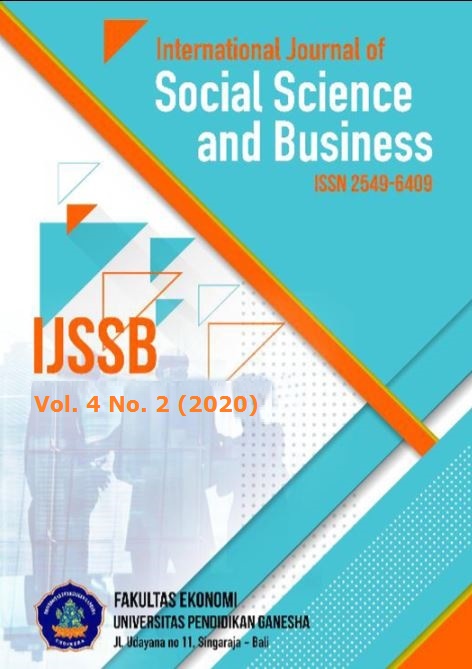Pengaruh Pendidikan Etika Bisnis, Religiusitas, Gender, dan Performa Akademik terhadap Persepsi Etis Mahasiswa Akuntansi
DOI:
https://doi.org/10.23887/ijssb.v4i2.24706Abstract
This study aims to examine whether there is influence of business ethics education, gender, religiosity, and Academic Performance of the Ethical Perceptions of accounting students who have worked in the city of Semarang. Independent variables in this research are business ethics education, gender, religiosity, and Academic Performance. The sample was taken by using purposive technique and obtained 90 respondents. The result of different test of independent sampl t-test shows that there is a significant difference between students who have not and have taken etbis courses on their ethical perception in making decision. There is a significant difference between students who have a GPA above or equal to 3.3 with students who have GPA below 3.3 on their ethical perceptions of decision making There is no significant difference between male and female students on their ethical perceptions in making decisions. There is a significant difference between students who have high degree of religiosity with students who have a low degree of religiosity their ethical perceptions in making decisions.
Key words: Ethical Perception, Academic Performance, Religiusity, Gender, Business Ethics Education.
References
Beltramini, R. F., R. A. Peterson, and G. Kozmetsky. 1984. “Concerns of College Students Regarding Business Ethics.” Journal of Business Ethics 3(3):195–200.
Betz, Michael, Lenahan O’Connell, and Jon M. Shepard. 2013. “Gender Differences in Proclivity for Unethical Behavior.” Citation Classics from The Journal of Business Ethics: Celebrating the First Thirty Years of Publication 427–432.
Bloodgood, James M., William H. Turnley, and Peter Mudrack. 2008. “The Influence of Ethics Instruction, Religiosity, and Intelligence on Cheating Behavior.” Journal of Business Ethics 82(3):557–71.
Duska, Ronald F. 1991. “What’s the Point of a Business Ethics Course?” Business Ethics Quarterly 1(4):335–54.
Galbraith, Sharon and Harriet Buckman Stephenson. 1993. “Decision Rules Used by Male and Female Business Students in Making Ethical Value Judgments: Another Look.” Journal of Business Ethics 12(3):227–33.
Hoffman, J. 2011. “Are Women Really More Ethical Than Men ? Maybe It Depen ... Are Women Really More Ethical Than Men ? Maybe It Depen ...” 10(1):1–4.
Kerr, D.S dan Smith, L. M. 1995. “Importance of and Approaches to Incorporating Ethicsinto the Accounting Classsroom.” Journal of Business Ethics 14 987–95.
Kidwell, Jeaneen M., Robert E. Stevens, and Art L. Bethke. 2013. “Differences in Ethical Perceptions between Male and Female Managers: Myth or Reality?” Citation Classics from The Journal of Business Ethics: Celebrating the First Thirty Years of Publication 6:329–35.
Magill, Gerard. 1992. “Theology in Business Ethics: Appealing to the Religious Imagination.” Journal of Business Ethics 11(2):129–35.
Maisarah Mohamed Saat, Stacey Porter, and Gordon Woodbine. 2009. “Does Religiosity Influence Ethical Sensitivity? An Investigation on Malaysian Future Accountants.” Malaysian Accounting Review 8(2):17–41.
Palmer, G. and T. Kandasaami. 1997. “Gender in Management.” The International Journal of Accounting and Business Society 5(1):67–99.
Pascarella, Ernest T. and Patrick T. Terenzini. 2005. “How College Affects Students: A Third Decade of Research.” How College Affects Students: A Third Decade of Research 534–45.
Trail, Carla et al. 2008. “Impact of Field of Study, College and Year on Calculation of Cumulative Grade Point Average.” Advances in Health Sciences Education 13(3):253–61.
Vitell, Scott J., Megan Keith, and Manisha Mathur. 2011. “Antecedents to the Justification of Norm Violating Behavior Among Business Practitioners.” Journal of Business Ethics 101(1):163–73.
Wati, Mirna and Bambang Sudibyo. 2016. “Pengaruh Pendidikan Etika Bisnis Dan Religiusitas Terhadap Persepsi Etis Mahasiswa Akuntansi.” Jurnal Economia 12(2):183–201.
Wiebe, Ken F. and J. Roland Fleck. 1980. “Personality Correlates of Intrinsic, Extrinsic, and Nonreligious Orientations.” Journal of Psychology: Interdisciplinary and Applied 105(2):181–87.
Zhang, Pidi and William L. Smith. 2011. “From High School to College: The Transition Experiences of Black and White Students.” Journal of Black Studies 42(5):828–45.











